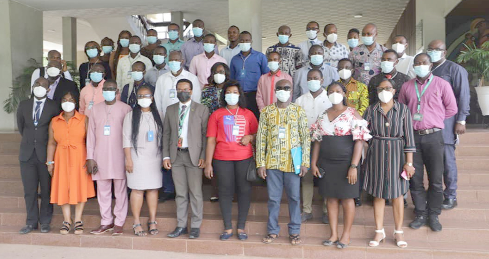
Scientists brainstorm to eradicate neglected tropical diseases
The Kumasi Centre for Collaborative Research (KCCR) in collaboration with the Ghana Health Service (GHS) is leading an initiative to help develop an operational research agenda on curbing neglected tropical skin diseases (NTDs) in the country.
The NTDs are a group of 20 World Health Organisation (WHO) listed diseases that are common in tropical and subtropical climates, and are usually neglected by the health systems in countries, and hence poorly funded for research control.
Advertisement
Consequently, the KCCR and the GHS have held a workshop to formulate a document which would help address gaps relating to the control, elimination and eradication of the NTDs.
The two-day workshop was partnered by the Kwame Nkrumah University of Science and Technology (KNUST) and the University of Ghana, with funding from the WHO.
Workshop
Forty-five participants, including scientists and focal persons in the health fraternity, drawn from across the country, discussed the research programme.
Among the resource persons who led the discussions were a researcher in NTDs at the Noguchi Medical Research Institute, Professor Dorothy Yeboah-Mensah; the Leprosy Programmes Manager, GHS, Dr Benedict Quao; and the Programmes Manager, Buruli Ulcer & Yaws, Dr Naana Konama.
The rest were the Chairman, Intra-Country Coordination Committee (ICCC) for NTDs, Dr Adam Hafez, and a researcher at KCCR, Dr Yaw Ampem Amoako.
Innovative data collection
Speaking at the opening ceremony, the Scientific Director, KCCR, who doubles as the Leader of Skin NTDs Research Group, Professor Richard Phillips , said the objective of the research was to document current data collection tools and to expose participants to potential innovative data collection tools.
"This will enable us to review and understand current case finding approaches and to review and brainstorm role of telemedicine" he explained.
He said the participants, by the end of the programme, would understand the role of integration and multidisciplinary approaches to research, and help propose ways to address research gaps identified.
NTDs
The common NTDs in Ghana include, leprosy , yaws , LF lymphoedema, buruli ulcer, cutaneous leishmaniasis, and scabies.
Over two billion people are infected with these diseases and can result in lifetime deformities, which lead to stigmatisation if not reported early.
In Africa, for instance, these diseases are reported mostly in poor rural communities where access to health facilities and clinical expertise is rarely existent.
In January 2021, WHO launched the road map for NTDs from 2021-2030, which is also linked to the Sustainable Development Goals (SDGs) and the Universal Health Coverage (UHC).
Its overall targets include a 90 per cent reduction in people requiring interventions against NTDs, 75 per cent fewer NTD-related disability-adjusted life year (DALYs) and the elimination of at least one NTD by 100 countries.



